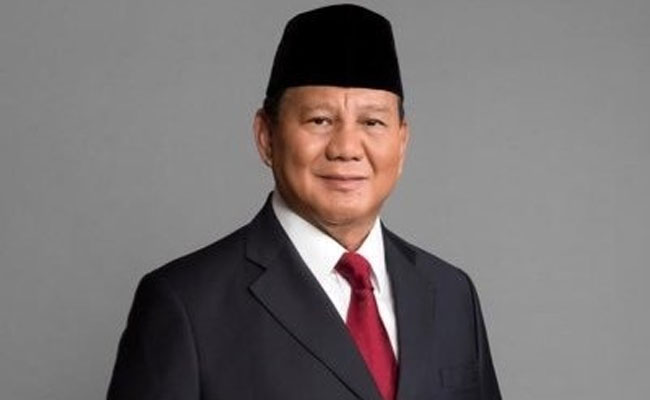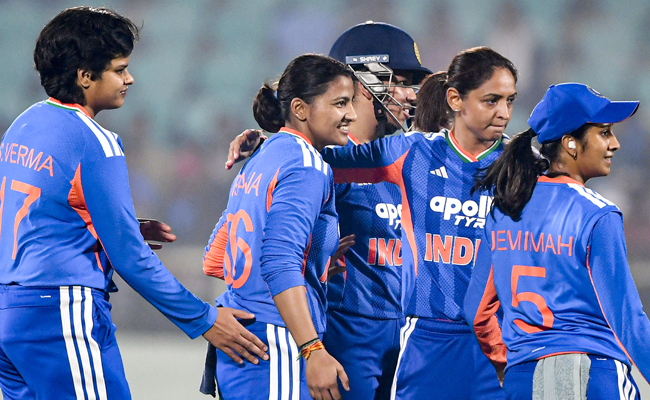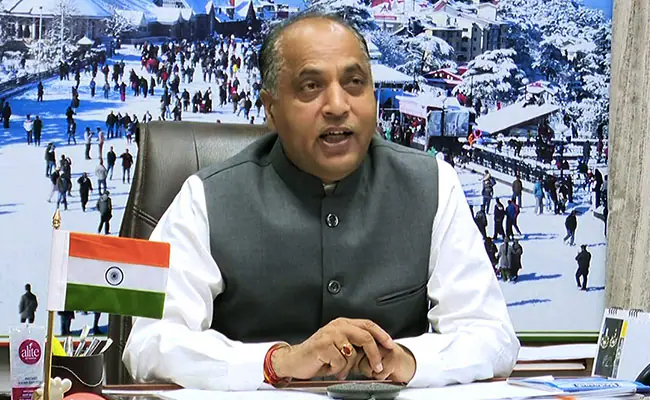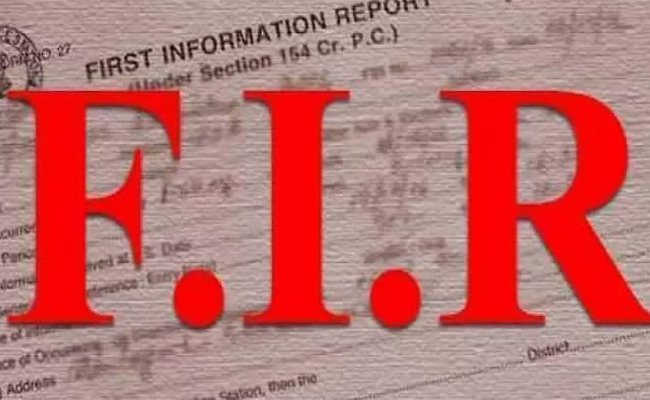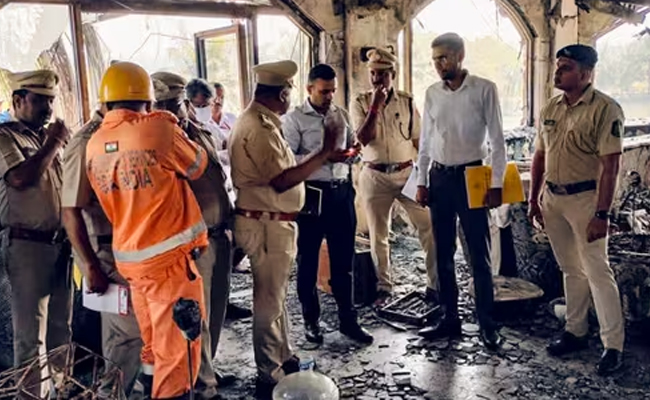Jakarta (AP/PTI): Indonesian Defence Minister Prabowo Subianto was announced the winner of the presidential election in the world's third-largest democracy on Wednesday over two former governors who vow to contest the result in court over alleged irregularities.
Subianto, who was accused of abuses under the past dictatorship and chose the son of the popular outgoing president as his running mate, won 58.6 per cent of the votes.
Former Jakarta Gov. Anies Baswedan received 24.9 per cent and former Central Java Gov. Ganjar Pranowo got 16.5 per cent, the General Election Commission said. It posted polling stations' tabulation forms on its website, allowing for independent verification.
Subianto said he will respect those who made different choices in the vote.
"We call on all Indonesian people to look to the future together," he told a news conference. "We must unite and join hands because our challenges as a nation are very big."
Subianto has received congratulatory messages from other Southeast Asian nations as well as the Chinese, Russian, French, Dutch and British governments, who all expressed their wishes to work with his new government.
"We look forward to partnering closely with President-elect Subianto and his Administration when they take office in October," US State Secretary Antony J. Blinken said after his victory was confirmed.
About 300 demonstrators held banners and signs criticising outgoing President Joko Widodo for supporting Subianto and alleging widespread fraud. They burned photos of the president with trash near the election commission's compound.
The second- and third-place finishers have refused to concede. On Thursday morning, Baswedan's lawyers filed a challenge to the results in the Constitutional Court. Pranowo also plans a court challenge.
"We do not want to let these various deviations from democracy pass without historical records and set a bad precedent for future election organisers," Baswedan said after final results were announced.
They have alleged fraud, citing the vice presidential candidacy of Widodo's son. Widodo could not run again, and his son's candidacy has been seen as a sign of his tacit backing of Subianto.
Widodo's son, Gibran Rakabuming Raka, is 37 but became Subianto's running mate after the Constitutional Court made an exception to the minimum age requirement of 40 for candidates. The court's chief justice, who is Widodo's brother-in-law, was then removed by an ethics panel for failing to recuse himself and for making last-minute changes to election candidacy requirements.
The new president will be inaugurated on October 20 and will have to appoint a Cabinet within two weeks.
Subianto had claimed victory on election day last month after unofficial tallies showed he was winning nearly 60 per cent of the votes.
Voter turnout was about 80 per cent, the election commission said.
Subianto won in 36 of 38 provinces and received 96.2 million votes compared to 40.9 million for Baswedan, who won in two provinces. Baswedan, the former head of an Islamic university, won a massive majority in the conservative westernmost province of Aceh.
Pranowo, the candidate of the governing Indonesian Democratic Party of Struggle, received 27 million votes and did not win any provinces.
Todung Mulya Lubis, a prominent lawyer who represents Pranowo, asserted that election irregularities occurred before, during and after the polls.
Widodo has dismissed the fraud allegations, saying the election process was watched by many people including representatives of the candidates, the election supervisory agency and security personnel.
"Layered supervision like this would eliminate possible fraud," Widodo told reporters last month. "Don't scream fraud. We have mechanisms to solve the fraud. If you have evidence, take it to the Election Supervisory Agency. If you have evidence, challenge it to the Constitutional Court."
The campaign teams of Baswedan and Pranowo said they would provide evidence for their claims.
But Lubis said his team has had difficulty getting witnesses to testify in court due to alleged intimidation by authorities. He acknowledged that successfully challenging the election result with such a wide official margin of victory will be difficult.
The ethics panel that removed Anwar Usman as the court's chief justice allowed him to remain on the court under certain conditions, including banning him from involvement when the court adjudicates election disputes this year.
That means any such cases brought to the court would be decided by eight justices instead of all nine members.
Subianto's campaign highlighted the Widodo administration's progress in reducing poverty and vowed to continue the modernisation agenda that has brought rapid growth and vaulted Indonesia into the ranks of middle-income countries.
But Subianto has laid out few other concrete plans for his presidency, leaving observers uncertain about what his election will mean for the country's growth and its still-maturing democracy.
Subianto lost two previous presidential elections to Widodo, and the Constitutional Court rejected his bids to overturn those results because of unfounded fraud allegations.
This time, Subianto embraced the popular leader and styled himself as his heir. His choice of Widodo's son as his running mate raised concerns about an emerging dynastic rule in Indonesia's 25-year-old democracy.
Subianto comes from one of the country's wealthiest families. His father was an influential politician who was a government minister under both the dictator Suharto and the country's first president, Sukarno.
Questions also are still unanswered about Subianto's alleged links to torture, disappearances and other human rights abuses in the final years of the brutal Suharto dictatorship, in which he served as a special forces lieutenant general.
Subianto was expelled by the army over accusations that he played a role in the kidnappings and torture of activists and other abuses. He never faced a trial and vehemently denies any involvement, although several of his men were tried and convicted.
It's not clear how Subianto will respond to political dissent, street protests and critical journalism. Many activists see his links to the Suharto regime as a threat.
Let the Truth be known. If you read VB and like VB, please be a VB Supporter and Help us deliver the Truth to one and all.
Visakhapatnam (PTI): Shafali Verma hit a blistering unbeaten 69 as India made short work of a paltry target to outclass Sri Lanka by seven wickets in the second Women’s T20 International here on Tuesday.
India now lead the five-match series 2-0 after another one-sided victory, having restricted Sri Lanka to a modest 128 for 9 through a collective display of disciplined bowling from the spin trio of seasoned Sneh Rana, ably complemented by young spinners Vaishnavi Sharma and Shree Charani.
During the chase, vice-captain Smriti Mandhana (14) fell cheaply but Shafali, enjoying new found confidence after a stellar show in the World Cup final, sent the bowlers on a leather-hunt during her 34-ball knock, winning it for her team in just 11.5 overs.
The hosts have now completed back-to-back successful chases within 15 overs which speaks volumes about the unit's sky-high confidence.
Shafali's innings had 11 punchy boundaries apart from a maximum.
The floodgates opened when left-arm spinner Inoka Ranaweera bowled a few flighted deliveries and Shafali would step out everytime to hit her over extra cover. Her footwork against slow bowlers was immaculate whether stepping out to loft the ball or rocking back to punch or pull.
Seeing her confidence, the newly appointed Delhi Capitals skipper Jemimah Rodrigues (26 off 15 balls) also attacked as the duo added 58 runs in just 4.3 overs.
By the time Rodrigues was out trying to hit one six too many, the match as a contest was over. Shafali completed her half-century off just 27 balls and completed the formalities in a jiffy.
Earlier, off-spinner Rana, who got a look-in after Deepti Sharma was ruled out due to fever, showed her utility keeping the Lankan batters under tight leash with figures of 1 for 11 in 4 overs, including a maiden which certainly is a rarity in T20 cricket.
Charani, who made an impression during India's ODI World Cup triumph, took 2 for 23 in her quota of overs, while Vaishnavi after an impressive debut in the opening encounter, finished with 2 for 32, not letting the Islanders get easy runs in her second spell.
The last six wickets fell for just 24 runs, but what stood out during India’s bowling effort was their superb ground fielding. After a patchy show in the previous game, the improved sharpness in the field resulted in three run-outs.
Sri Lankan skipper Chamari Athapaththu (31 off 24 balls) looked in good nick as she deposited length deliveries from seamers Kranti Gaud and Arundhati Reddy over the ropes but it was Rana, who kept her quiet by repeatedly pitching on good length.
Unable to manoeuvre the strike and with the big hits suddenly drying up, Athapaththu chanced her arm at another delivery in which Rana had shortened the length slightly.
Not having transferred the weight into the lofted shot, Athapaththu's hoick was pouched cleanly by Amanjot Kaur at long-off.
This was after Athapaththu's opening partner Vishmi Gunaratne (1) had offered a simple return catch to Gaud.
Hasini Perera (22 off 28 balls) and Harshitha Samarawickrama (33 off 32 balls) did stitch a stand of 44 but they could never set the tempo against the Indian spin troika.
Once Hasini offered a tame return catch off a Charani full-toss, Sri Lankans never recovered and lost wickets in a heap towards the end.

